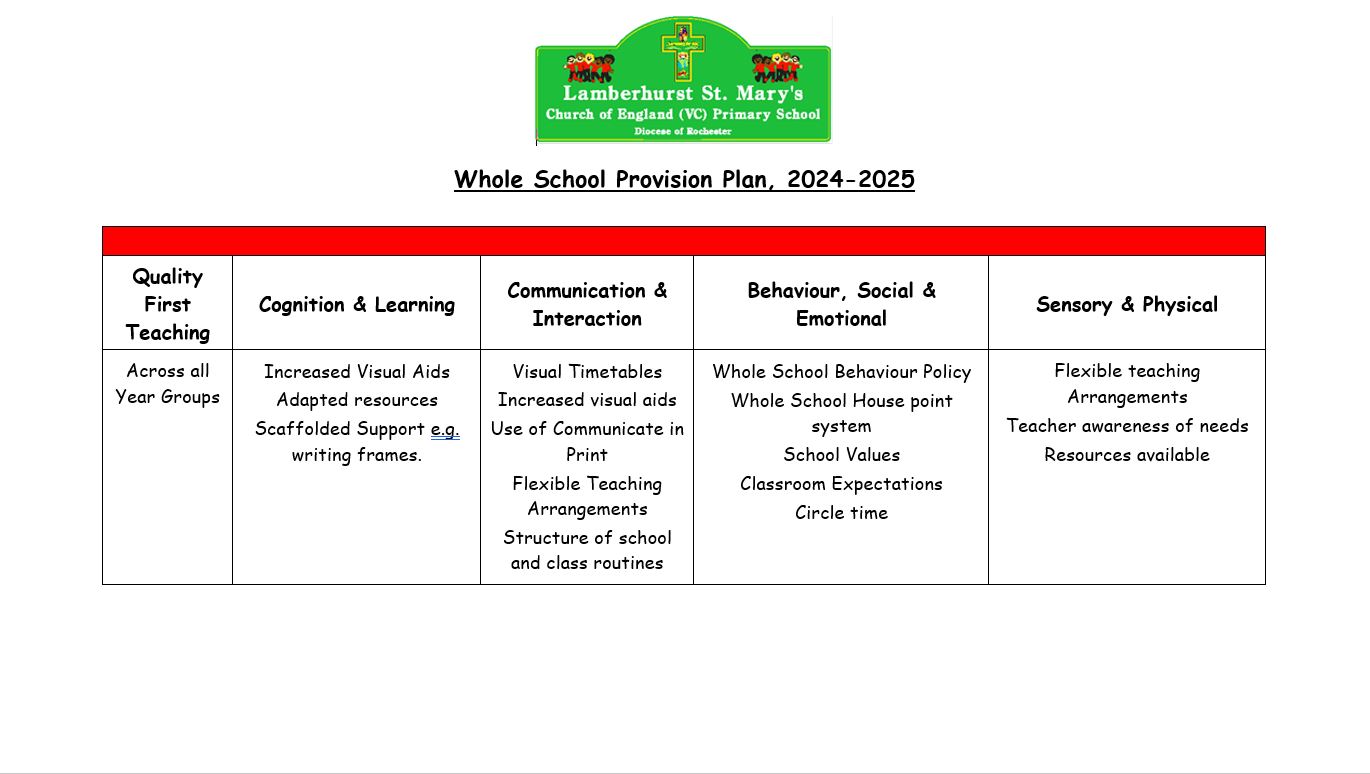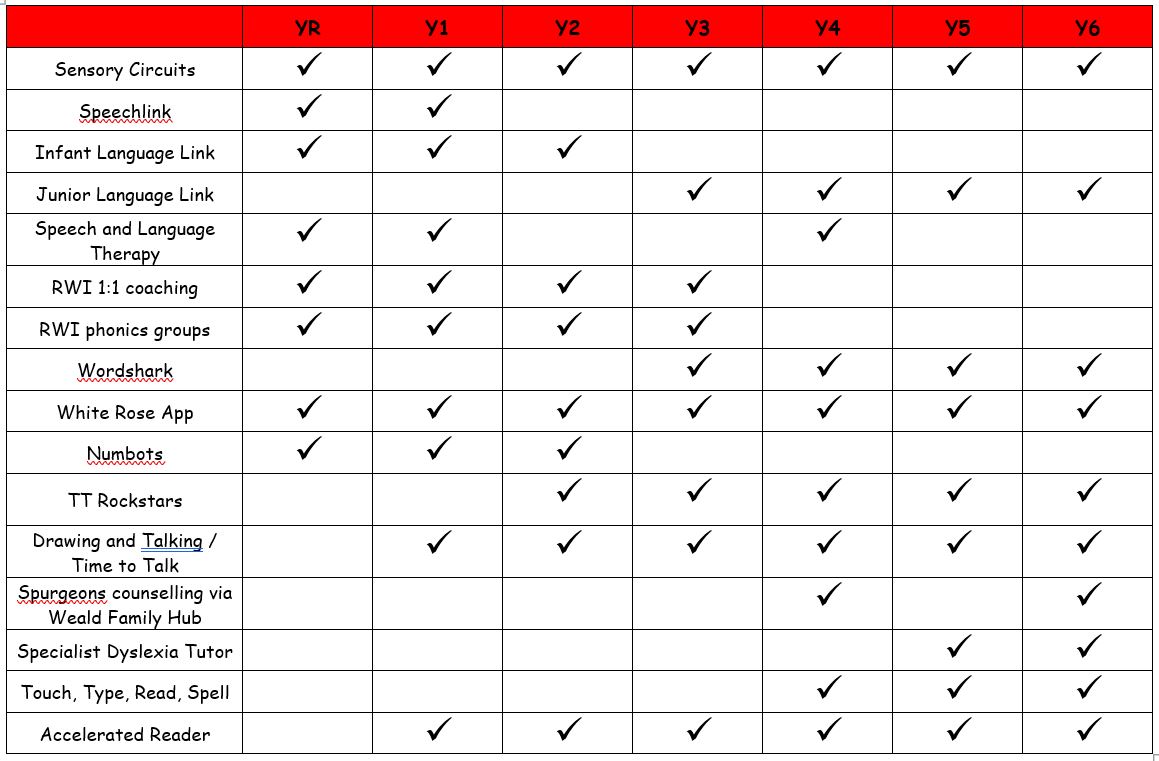Special Educational Needs
SEND: Information about Special Educational Needs for Parents and Carers
In line with our Christian ethos, we believe that each child is unique with different gifts and talents, and a different rate of growth and educational development. All pupils will be encouraged to reach their potential through a variety of teaching and learning methods, with regular assessment on progress and attention to individual needs. Consideration is given to the physical, learning, emotional and behavioural needs of children.
Many children’s needs are met through adapted and/or scaffolded/supported class work, small group work or individual support within the classroom. The school runs a number of programmes to cater for particular needs e.g. Beat Dyslexia, Nessy, Clicker 6, Drawing and Talking Therapy, Memory Magic, Sensory Circuits, Social Skills groups and Precision teaching. Progress is carefully monitored using Entry and Exit data.
Parents are included at all stages and are considered joint partners in their child’s education.
What is ‘Special Educational Needs’?
Children have Special Educational Needs if they have a learning difficulty that calls for special educational provision to be made for them.
They may have difficulty with one or more of the following:
- Cognition and Learning
- Communication and Interaction
- Behavioural, Emotional and Social
- Sensory / Physical
We know that children learn and develop in different ways so we use different teaching styles, differentiate work according to individual or group needs, use a variety of resources. This is called Quality First Teaching.
What happens if your child does not make expected progress?If your child needs support in one of the four areas mentioned, the class teacher, together with the SENCO, will decide the type and level of support. This may change dependent on various factors but interventions / extra support are carefully monitored on a regular basis.
What could the support look like?
The support given to your child could be within class, as part of a small group or one to one help. The class teacher and SENCO will best assess which type and level of support is needed. Often this action will be enough for your child to overcome / develop strategies to allow them to make good progress.
If children present complex needs or fail to make progress we refer them to our Local Inclusion Forum panel (LIFT) to access further expertise through the full range of professional agencies. Advice sought from these outside agencies could include advice from specialist teachers, educational psychologists, speech and language therapists or physiotherapists. In this case, we work alongside parents and professionals to carry out further assessments and implement advice/recommendations given.A few children have their needs set out in an Educational Health Care Plan (EHCP) drawn up by the Local Authority.
How is support monitored?
Each term teachers meet with the SENCO to review class provision maps.
- Interventions are closely monitored and evaluated by using Entry and Exit data.
- Parents are informed of interventions via Parent Notification forms which state whether their child is on the SEND register or the school’s Nurture List. These are signed and a copy is given to parents.
- Interventions are discussed with class teachers at Parent Consultations (three times a year).
- Sometimes a parent, class teacher and/or SENCO will ask for additional meetings to discuss interventions / progress / next steps etc.
- Your child would also be discussed at regular Pupil Progress meetings throughout the school year.
What does the SENCO do?
SENCO = Special Educational needs Co-ordinator. If your child needs support, the SENCO will:
- Ensure the right support is put in place together with the class teacher.
- Advise teachers on how to help your child.
- Work closely with you regarding your child’s needs and listen to any ideas or concerns you might have.
- Work with professionals (if necessary) who may be able to help your child.
Admission of pupils with disabilities
All pupils with additional needs or disabilities are offered a bespoke and nurtured induction into our school. This induction includes:
- Liaison with parents/carers before and during transition
- Liaison with previous school/pre-school/childminder/nanny before and during transition
- Bespoke arrangements for induction according to the needs of the pupil and the family
- Regular contact with class teaching team, SENCO and Headteacher.
Lamberhurst St Mary’s is a church school and our values are embedded in all aspects of school life which seek to ensure that no pupils, particularly those with disability, are treated unfavourably. This is achieved through:
- Assemblies, lessons and activities which promote and recognise disability
- Visitors with disability who are role models
- Adjustment to timetables and resources to facilitate inclusion
- Inter-school activities with local specialist provision schools
- Peer mentors/helpers for pupils when needs identified, e.g. residential trips, sports activities and school clubs
School facilities include:
- Five disabled toilets (all school levels have at least one accessible toilet)
- A passenger lift to all floors
- Wheelchair (assisted) access to the all-weather pitch
- Coloured flooring to assist visually impaired children and adults
- Coloured classroom storage trays to assist visually impaired children and adults
- Coloured book overlays and exercise books for visually impaired children
- Weekly school newsletter sent by email to allow computer enhanced bold text for visually impaired parents
Contacts
If you have a concern about your child then your child’s class teacher is the first person to talk to so that they can plan for ways to give your child support in class. Class teachers can also give parents help, advice and support with strategies and materials that parents can use at home to support their own child.
You can also contact the SENCO (Mrs Carla Belling) via the school office (secretary@lamberhurst.kent.sch.uk), or via the headteacher, Mrs Caroline Bromley (headteacher@lamberhurst.kent.sch.uk), who shares the role of SENCO.
Useful Websites
KCC Local Offer: Gives children and young people with special educational needs or disabilities and their families information about what support services the local authority think will be available in their local area. KCC Local Offer SEND
send information report dec 2025.pdf
Mainstream Core Standards for Parents:
Mainstream Core Standards Guide for Parents
IASK: Parent Information, Advice and Support Kent (IASK) - free, impartial and confidential information, advice and support about special educational needs and disabilities (SEND) for children, young people up to age 25, parents and carers
Click here to view our Accessibility Plan
Whole School Provision Plan

 How to make a complaint about SEND support?
How to make a complaint about SEND support?
We encourage parents who have a complaint about the nature or amount of SEND support their child receives to discuss their concerns with the class teacher, SENCO or Headteacher in order to resolve the issue before making a complaint formally through the complaints policy. A copy of the complaints policy is available on the Policies section of the website.
Should a formal complaint be received and it remains unresolved after this, the complainant can appeal to the First–tier Tribunal (Special Educational Needs and Disability), if the case refers to disability discrimination, or to the Secretary of State for all other cases. There are some circumstances, usually for children who have an Education and Health Care Plan, where there is a statutory right for parents to appeal against a decision of the Local Authority. Complaints which fall within this category cannot be investigated by the school.
